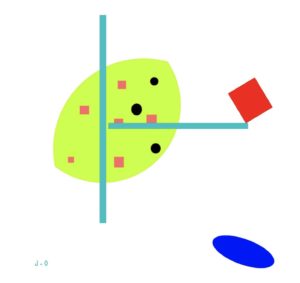The way one defines love, has everything to do with how one self-loves. Imagine your intellect, as your “parent-self.” Then imagine your physical-self as your “ward-self.” And let’s call that ethereal-self that one sometimes senses, but know little of, as the spiritual-self. Thus we have a trinity: The father/mother aspect of self, the child aspect of self, and the complex, other-worldly-self. Let’s focus on what is easier to talk about: the love one practices between one’s parent-self and child-self.
Extreme practices yield perverse results. So a child that is overly indulged, often ends up becoming a problem for herself and others. On the other hand, if the child is raised under terribly strict, and rigid rules, they may still end up becoming a problem to self and others. From this perspective, the ideal ratio would then be to nurture the child with the right amount of discipline and validation—and let’s face it, perfection, though unattainable, is also a form of extremism. So it would probably be healthier if one is nurtured somewhat imperfectly with a good dose of discipline and tolerance. Obviously, the proper way to bring up another human would be challenging, and I think it is even more difficult when the self you are shaping, is your very own self.
By nurturing a child in a complex and difficult world with over-indulgence, is a parent really practicing love or selfishness? When saying no to a child causes a parent so much discomfort that they always say yes even when they ought to say no, is this love just because one claims it is love? I beg to differ. In the same way, when a cold parent who finds it extremely uncomfortable to practice warmth raises a child as if they were a robot, exclaims that their practice is love, I must disagree. In other words, not being able to say, no, to yourself is not self-love. It is a form of gluttony that promises self-ruination. Being too hard on yourself, is also not self-love, but a form of arrogance. That is, to have forgotten or not realize that “to err is human.”
Love that can only flow and mold from a place of comfort is selfishness. This is perverse love. Love must be a combination of pain and joy. Pain that yields joy and joy that respects pain.

So when I say self-love, despite its immediate individualistic preface, I actually mean, learning how to cook first before going over to cook for the neighbor. How to love is something that one must learn to recognize, practice and understand in one-self in order to be able to replicate, with less dire effects, with others. How do you describe the warmth of the sun to someone who has never felt the rays if you have only absentmindedly experienced it? The winter sun is, after all, different from the summer sun. And the winters of childhood are different from those of adulthood. You get the point.
Thus to practice self-love is to learn how to mold oneself in both comfort and discomfort. To be able to face oneself and call out the self. But also to be kind and forgiving to yourself. Self-love, contrary to popular opinion, is not an easy selfish practice. It is to always be naked to self; to see our strengths and weaknesses and to work on both. To study both the ugly and beautiful selves we possess without despair or pride, but with humility and courage to improve; and to make all aspects of ourselves recognizable in not just all human beings but in inanimate things as well.
This is what I mean when I say self-love and this is why I believe that the practice of self-love is essential to the wellbeing of society. When you can love yourself, that is, face your flaws and magnificence with honesty and humility, and see all aspects of yourself in others, it becomes so much easier to love others as you love yourself. Because yourself then ceases to be separated from other selves. Because when you really love yourself, you realize how much your happiness depends on your neighbors’ happiness. Thus it is to your benefit if your neighbor is happy. In this way, one realizes that to love oneself is to love others, and to love others is to love oneself.
JAO


